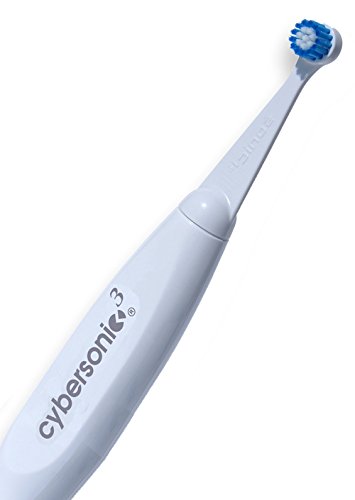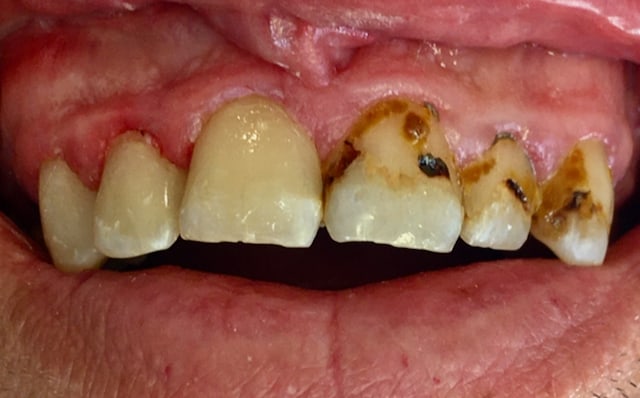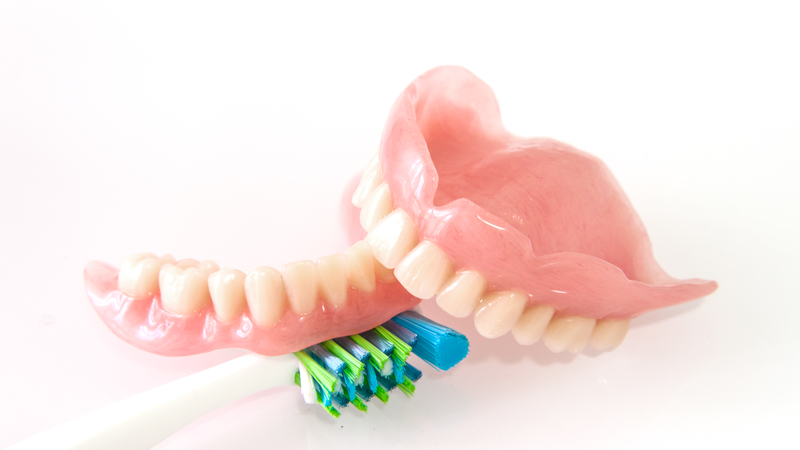Tooth Nerve Pain;
causes and remedies.
Tooth nerve pain can be extremely severe.
This is a painful toothache that is caused by the tooth nerve INSIDE the tooth; NOT an infection in the gum around the tooth.
Dentists call pain from the tooth nerve, deep inside the tooth, "pulpitis", which looks like a funny kind of a word for a toothache, but it's made up of 2 other words: "pulp", which is the dental term for the nerve inside a tooth, and "itis" which means inflammation, like in tonsillitis or dermatitis.
So "pulpitis" means an inflammation of the tooth nerve. If the nerve buried deep inside the tooth becomes inflamed for whatever reason, it can be extremely painful.
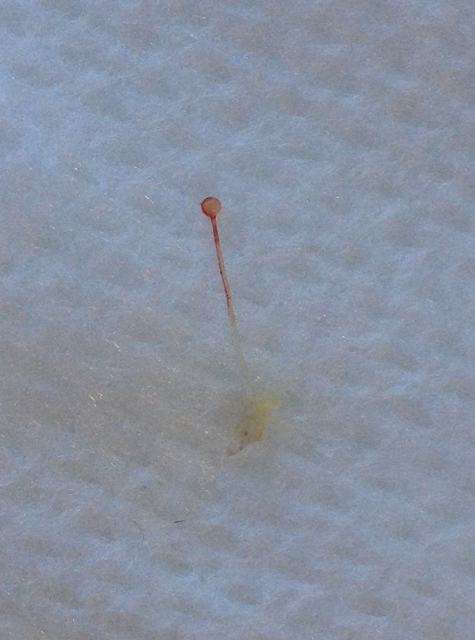 a nerve from a tooth
a nerve from a toothIn the photo above, the tooth nerve has just been removed from a tooth. This is what a tooth nerve looks like! The red end is still alive, causing severe toothache; the white end has died, and is just dead tissue.
How can such a tiny little nerve cause so much pain?
It's due to the fact that the nerve is completely surrounded by a rock-hard, rigid tube: the tooth! The nerve is a bit like the pencil lead running down inside a pencil. If it gets a bit inflamed for any reason, it wants to swell up a little, like when you accidentally hit your thumb with a hammer. Your thumb can swell up, and it's a bit sore, but settles down in a few days.
BUT the nerve buried inside a tooth cannot swell up, because it's encased in the middle of a rock-hard tooth. So what happens is this; as the nerve tissue becomes inflamed, (maybe due to a cavity or to a knock on the tooth), it tries to swell up as tissue fluid leaks out of the tiny blood capillaries. The result is that the pressure inside the tooth goes up.
Tooth Nerve Pain - the causes
The most frequent causes of tooth nerve pain are;
1. Exposed tooth roots, where the gum has receded. This usually causes sensitivity to cold drinks or cold air. It can be made worse by scrubbing your teeth aggressively with a hard toothbrush.
2. A crack in a tooth or in a filling. Even though nothing has broken off, the crack will let bacteria into the tooth, irritating the nerve and making it sensitive.
3. A leaking filling. Again, this allows bacteria to get in under the filling, causing decay and irritating the tooth nerve.
4. Excessive tooth wear caused by grinding or clenching your teeth at night. This is much more common than people think! The habit wears the enamel off the biting surfaces of the teeth, exposing the dentine, which is sensitive to hot, cold, and acidic drinks.
Tooth Nerve Pain
5. Trauma to the tooth, such as biting on a cherry stone, or getting a knock to a front tooth by falling or in an accident. The blow to the tooth literally bruises the socket that the tooth sits in, and may disrupt the blood supply to the tooth. The nerve reacts by getting painful.
In all these situations, the tooth nerve becomes inflamed, tries to swell up but can't, so the pressure inside the tooth increases.
When the pressure inside the tooth goes up, two things happen.
First, it hurts, because the nerve is being pinched. This is that constant, throbbing tooth nerve pain.
Second, the tiny blood capillaries inside the tooth also get compressed and squashed. This in turn starts to limit the blood flow to the tooth nerve. The pain begins to get worse.
The tiny blood vessels supplying the tooth nerve have to pass through the narrowest constriction at the very tip of the root. This is a very small hole, much smaller than the size of the nerve canal inside the main part of the root.
The root tip is called "the apex" of the tooth; and the narrow opening for the blood vessels to get out is called "the apical constriction". We even give it a name implying how small it is!
What happens next depends on how badly the tooth nerve is inflamed.
Sometimes it can get better. Other times, it only gets worse.
If your tooth nerve pain has a chance of getting better, dentists call the type of inflammation "reversible pulpitis". This means that something can be done to reverse the situation, and get back to normal.
BUT if the nerve has become damaged by the pressure from the inflammation, then dentists will call this "irreversible pulpitis". It cannot be reversed. The process has gone too far. It's a bit like gangrene in a toe that has been frostbitten. The nerve will die.
 Tooth nerve pain
Tooth nerve painIrreversible pulpitis.
BUT the nerve will NOT die in one quick go. It happens over a period of time. It usually dies in little sections, like in the photo at the top of the page, with the bit that is still alive continuing to cause pain. This situation is usually the cause of the worst tooth nerve pain of all.
You will have a severe, constant throbbing ache. Anything hot or even warm will make it worse. Even the warmth from your cheek can affect the tooth. Sipping cold water and holding the water over the problem tooth will dull the pain for a few minutes.
At this point, only rinsing with cold water will help much. You have to keep sipping cold water and holding it next to the tooth. As soon as the water warms up a little, you have to spit it out and take another mouthful of the cold stuff. An ice cube can work well, and lasts a little longer.
The only solution with irreversible pulpitis is to get along to a dentist as quickly as you can. The treatment choices you face are limited to just 2; either get the tooth taken out, or else save the tooth with root canal treatment.
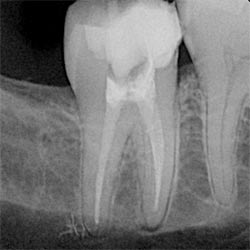 a root-filled molar
a root-filled molarThe image above shows a root canal filling in a molar tooth.
Remember to check out my top recommended electric toothbrush, which has the best performance and a great price at Amazon - the Cybersonic 3 brush.
You can read more about your options at my other pages on getting a tooth pulled and Root Canal Procedure.
In the meantime, if you can't get to a dentist quickly, there are some tricks that may help. Read more about this at Toothache Home Remedies.
If you are in a lot of pain, there is a very specific regime using over-the-counter products that provides a high level of pain control: take 600 mg of ibuprofen (3 standard Advil tablets) WITH 1000 mg acetaminophen (2 Extra-Strength Tylenol), and repeat every 6 hours as needed.
Don't exceed 3 grams of acetaminophen (6 Tylenol tabs) a day, and don't take it in combination with alcohol. Do not use this if you have a peptic ulcer, or liver/kidney disease. This should help your pain for now.
What about reversible pulpitis? Obviously something's wrong with the tooth for it to hurt like this, so my advice is the same - get along to a dentist as soon as you can. The quicker you let him take a look, the better the chances that he can fix the problem and get the tooth settled down for you.
Most times, it will just be a normal filling that's needed. No biggie!
 toothache
toothacheBUT if you wait, hoping it will settle down on it's own, you run a very big risk of your pulpitis drifting from "reversible" into "irreversible", which means much more tooth nerve pain, and more complicated (and expensive) treatment to put things right!
The Cause of Tooth Nerve Pain
There are just TWO main causes of tooth nerve pain.
1. The most common cause is BACTERIA inside the nerve, from tooth decay in a cavity, or a leaking filling. Once you get a little cavity started in a tooth, the bacteria in there slowly destroy the tooth material, so the cavity gets bigger.
As the cavity gets bigger, the bacteria are getting closer to the nerve, buried deep inside the middle of the tooth. At first, the tooth will start to become a little sensitive to sweet things and acidic food and drinks, and then to cold things as well.
This is because the cavity is allowing the cold water to get inside the tooth and so close to the nerve.
At this point, as soon as you stop putting cold water on the tooth, the pain goes away. But if you just leave the situation to develop, hoping it'll get better on it's own, then eventually the bacteria reach the nerve inside the tooth, and it starts to die.
That's when the tooth nerve pain starts. The bacteria in the decay have infected the nerve.
Some patients have asked me a very interesting question; if the bacteria in tooth decay cause an infection inside the tooth nerve, why can't we treat it with antibiotics? Why can't the antibiotics kill the bacteria inside the nerve, and allow it to settle down?
It's a very good point. But the answer is even better - for antibiotics to work, you have to get the antibiotic right into the source of the infection. And that's the problem. The cavity in the tooth does not have any blood supply, so it's impossible to get the antibiotics into where it's needed.
It just doesn't work. And believe me, there's been plenty of research into this possibility.
2. The OTHER main cause of pulpitis is a cracked or broken tooth. This can happen from a knock or a blow directly on the tooth in an accident, OR sometimes a tooth develops a fine crack through it after many years of hard use or tooth grinding, and one day it just splits in half. It's basically just a structural failure.
The crack allows bacteria in your saliva to penetrate deep into the tooth and eventually to the nerve.
If your tooth breaks and you get severe pain, the chances are that the nerve itself has been exposed. In this case, you may need to have the tooth removed, if the fracture line goes more than a millimeter or two under the gum.
If the fracture line is ABOVE the gum, then you may be able to save the tooth with a root canal and a crown.
So if you're getting any kind of toothache, my BEST recommendation is to get a dentist to check it out as soon as possible. The earlier you get a problem looked, the quicker, simpler and cheaper it is!
We all know how expensive dental treatment can be, so why waste time, have more tooth nerve pain, and end up with a BIG dentist bill? Go to a dentist AS SOON AS YOU CAN!
You can read more about "pulpitis" at THIS dedicated page.
